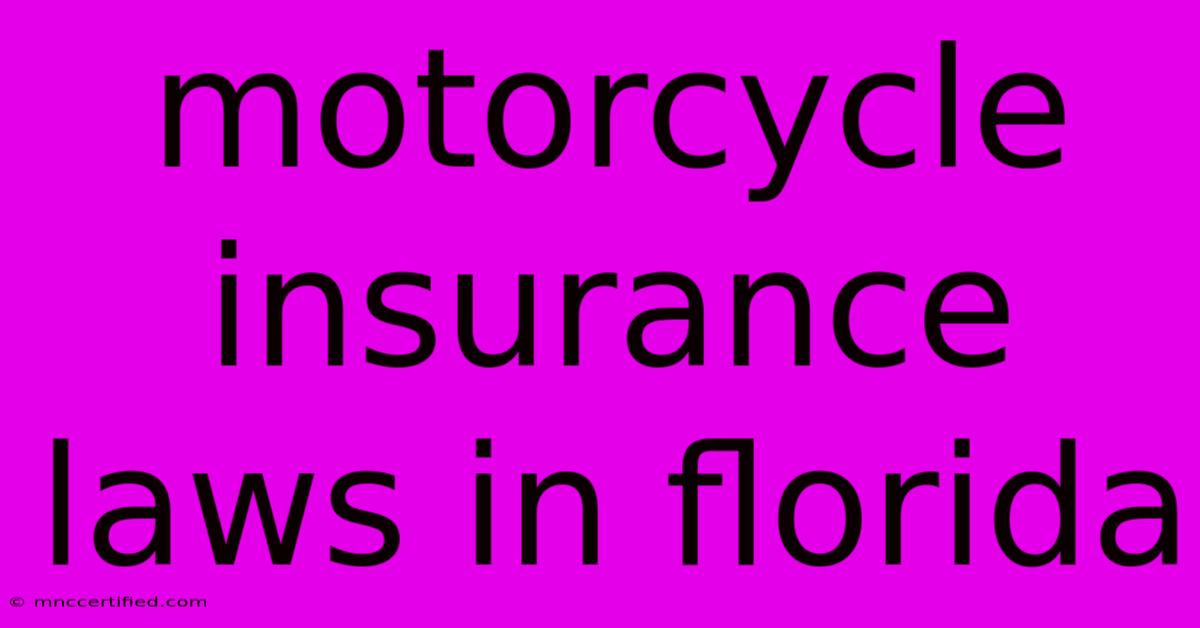Motorcycle Insurance Laws In Florida

Table of Contents
Navigating Florida's Motorcycle Insurance Laws: What You Need to Know
Riding a motorcycle in Florida is a liberating experience, but it's crucial to understand the state's specific motorcycle insurance laws. Florida is a no-fault insurance state, which means your insurance company will cover your medical expenses, regardless of who caused the accident. However, it's important to be aware of the different coverage options and legal requirements to ensure you're protected on the road.
Required Motorcycle Insurance in Florida
Florida law mandates that all motorcycle owners carry minimum liability insurance, which includes:
- $10,000 Personal Injury Protection (PIP): Covers medical expenses, lost wages, and other related costs for you and your passengers, up to $10,000 per person, per accident.
- $10,000 Property Damage Liability (PDL): Covers damage you cause to another person's property, up to $10,000 per accident.
Note: These minimum coverage limits are the bare minimum, and you may want to consider higher limits for better protection.
Additional Coverage Options: Protecting Yourself and Your Investment
While the minimum coverage requirements are necessary, they don't fully protect you from financial hardship in case of an accident. Here are some additional coverage options that can offer peace of mind:
- Uninsured/Underinsured Motorist (UM/UIM): This covers you if you are involved in an accident with a driver who has no insurance or insufficient coverage to cover your damages.
- Collision Coverage: Covers repairs or replacement of your motorcycle if you are involved in an accident, regardless of who is at fault.
- Comprehensive Coverage: Covers damage to your motorcycle caused by events like theft, vandalism, fire, or natural disasters.
Understanding Florida's No-Fault System
As a no-fault state, Florida requires drivers to seek coverage for their medical expenses through their own insurance company, regardless of who caused the accident. However, there are exceptions:
- If your injuries are serious enough to meet the "serious injury" threshold, you may be able to sue the other driver for additional damages.
- If you're not at fault for the accident and the other driver does not have insurance, you can file a claim through your uninsured/underinsured motorist coverage.
Tips for Choosing Motorcycle Insurance in Florida
- Compare Quotes: Don't settle for the first quote you receive. Shop around and compare rates from multiple insurance providers.
- Consider Your Riding Habits: Your riding history, motorcycle type, and location can all impact your insurance premium.
- Ask About Discounts: Many insurance companies offer discounts for factors like safe riding courses, anti-theft devices, and multi-vehicle policies.
- Review Your Policy Carefully: Before signing any policy, make sure you understand the coverage details, limitations, and exclusions.
Conclusion
Being aware of Florida's motorcycle insurance laws is essential for any rider. By understanding the requirements and available coverage options, you can make informed decisions to protect yourself and your investment. Remember, choosing the right insurance policy can provide peace of mind while riding and give you the confidence to enjoy the open road.

Thank you for visiting our website wich cover about Motorcycle Insurance Laws In Florida. We hope the information provided has been useful to you. Feel free to contact us if you have any questions or need further assistance. See you next time and dont miss to bookmark.
Featured Posts
-
Loan Watch Stephenson And Williams Net Goals Doak Assists
Nov 11, 2024
-
Rugby Union Wales Takes On Fiji In Match
Nov 11, 2024
-
Bills Vs Colts Live Tv Channel And Stream
Nov 11, 2024
-
What Happened To Kevin Costner In Yellowstone
Nov 11, 2024
-
Yamal Olmo Injury Concerns For Barcelona
Nov 11, 2024